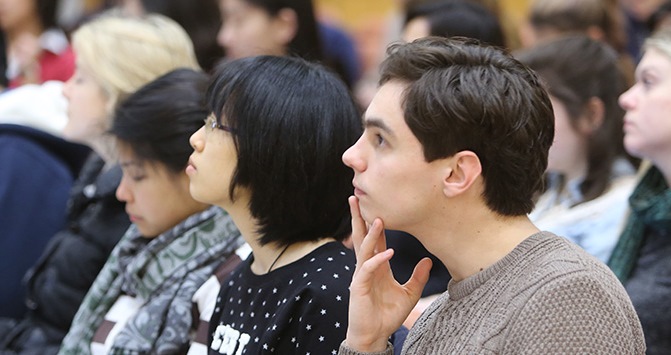LSE International Development students have their say on “The Great Lecture Notes Debate”:
Xu Gong – MSc in Development Studies.
For me, pre-circulated notes may reduce my motivation to finish all required readings before lectures. I took history classes at the LSE when I was an undergraduate, notes were always posted on Moodle before lectures. I sometimes skipped readings after I read lecture slides. However, MSc courses are much more demanding. Topics in international development are interdisciplinary, and readings and lectures are more difficult to digest without notes in advance.
If lecture outlines are given before lectures, we will be more prepared for the lecture. Meanwhile, it will not reduce our motivation to finish related readings. I think pre-circulated lecture outlines will encourage me to do the readings, and to find the linkages of the readings. It may improve my learning.
Louisa Tomar – MSc Development Management
Although I do not read the lecture slides prior to coming to class, unless explicitly asked, I absolutely see the value of providing them in advance. I often look around the room and see my peers taking thoughtful notes directly on the slides and/or cutting and pasting diagrams and graphs (that I’m struggling to draw!) into their notes in Word, PPT and other programs. I’m envious at how seamlessly many of my classmates build upon material on slides and incorporate them into their electronic notes as they go. I’ve seen them pull up Wikipedia pages on the Economists /theories being discussed and link them into the slides for cross referencing later. I think for many, having the slides in advance allows them to be more thoughtful about what they add and include, so while I’m rushing to take down everything that’s on a slide, my peers are actively listening and adding the bonus material that is being said (some of which, I may not be absorbing to the same degree.) Additionally, we are a very large group so many of us do not sit particularly close to the screen – for anyone who doesn’t have perfect vision, it’s quite helpful to see the slides directly in front of you rather than straining to see the tiny print next to graphs and diagrams.
Michiru Toda – MSc Development Management
To summarize the arguments supporting the notion that the lectures notes be circulated in advance:
(1) There is no master lecture note that works well for everyone because each student has different knowledge, experience, beliefs and priorities into the lecture hall with them.
(2) The important of notes is in taking the notes like training, not in the notes themselves.
(3) The advance circulation might give students a false security and discourage students to work hard. Some students scroll through lecture slides, taking a few notes in the margins.
In terms of (1) and (2), the importance of making own notes, these arguments assume that every student can completely grasp what lecturers talk in order to make their own notes.
In fact, each lecture has different – sometimes strong – accents and English proficiency of students vary. Moreover, some lecturers seem to talk relatively faster in spite of the recommendation that presenters take at least two minutes per slide. As long as LSE is being proud of itself as an international school and accepting students with various levels of English proficiency (IELTS overall 7.0 minimum), international students, especially those for whom English is a second language, should deserve a certain consideration. Considering these points, I would say that the assumption of the argument seems wrong.
In terms of (3), we have to consider the reverse risk that some students might concentrate on taking down every single word rather than deeply reflecting what lecturers are taking. If students keep the lecture notes at hand, they can concentrate on lectures themselves and taking their truly own notes.
What exactly do you have when you have ‘the lecture notes’ in advance?
My argument might stray from directly answering to the question above, but my concern would be ‘what we would lose when we do not have ‘the lecture notes’ in advance’; we might lose the opportunity of delivering/receiving the messages in the lectures.
My arguments focus on the aspect of ‘during lectures’ rather than preparation, hence I would not request the circulation in much advance, as long as students keep the lecture notes at hand during the lecture.
Related Posts







Good discussion – I think you’re going to have to organize a vote on this one!